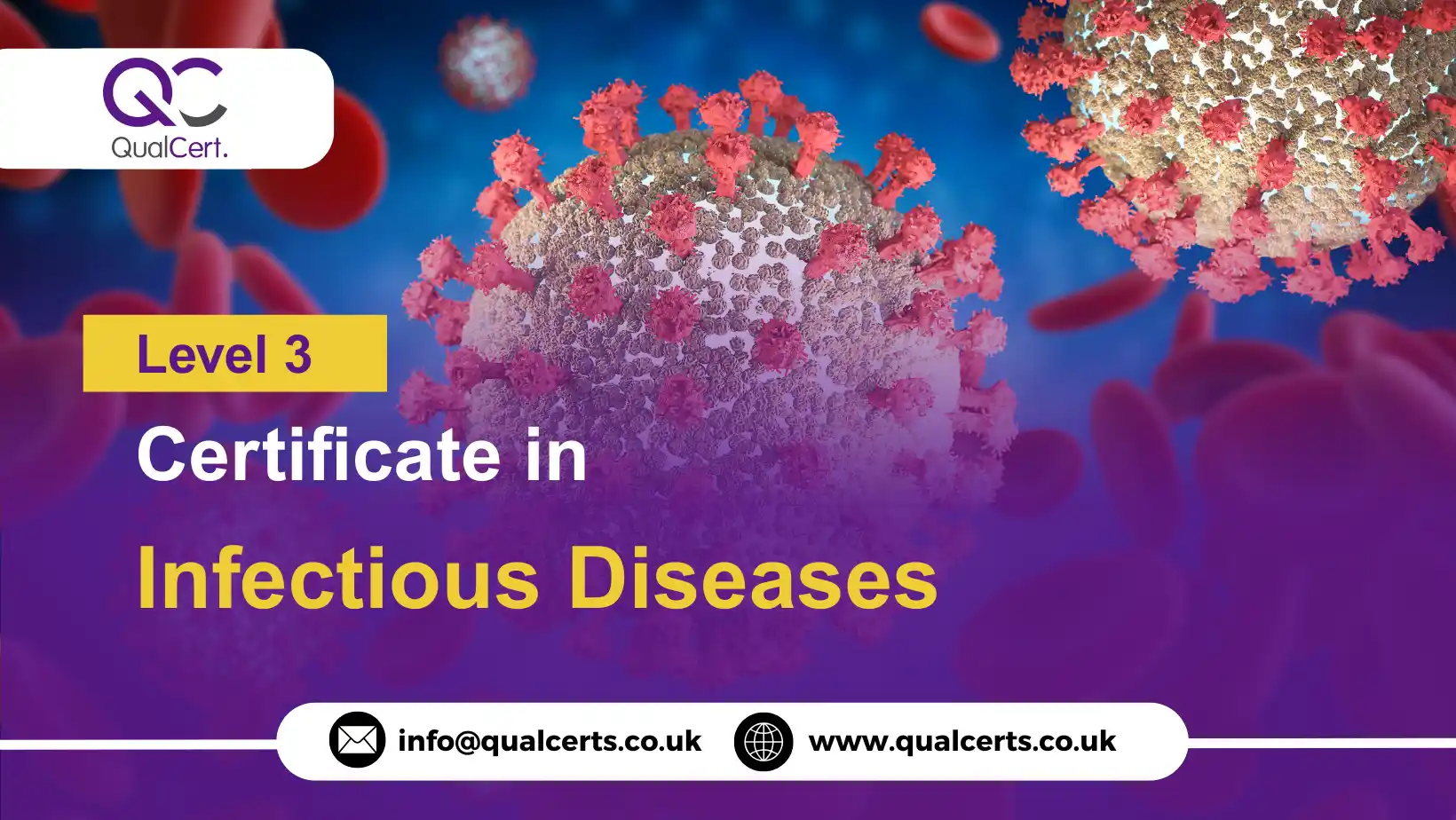The QualCert Level 3 Certificate in Infectious Diseases is a specialist qualification designed to provide learners with essential knowledge and skills to understand, prevent, and manage infectious diseases within healthcare and community settings. As global health challenges continue to evolve, there is a growing demand for professionals who can respond effectively to infectious outbreaks, implement prevention strategies, and contribute to public health initiatives.
This qualification equips learners with a strong foundation in microbiology, epidemiology, infection control, and public health principles. It also focuses on the identification, monitoring, and management of infectious diseases, ensuring learners can work safely and professionally in a variety of healthcare environments.
The Level 3 Certificate in Infectious Diseases introduces learners to both theoretical concepts and practical approaches in infection prevention and control. The course covers a wide range of topics, including common bacterial, viral, and fungal infections, modes of transmission, immunisation strategies, and regulatory guidelines for disease prevention.
By the end of the programme, learners will be able to understand how infectious diseases spread, how to implement control measures, and how to protect both patients and staff in healthcare and community settings. This qualification aligns with UK and international healthcare standards, preparing learners for professional roles and further study in public health, microbiology, or epidemiology.
The QualCert Level 3 Certificate in Infectious Diseases provides a comprehensive foundation in infection prevention, control, and management. With a focus on patient safety, public health, and professional practice, this course equips learners with the knowledge and skills needed to respond effectively to infectious disease challenges.
Course Contents of QualCert Level 3 Certificate in Infectious Diseases:
The QualCert Level 3 Certificate in Infectious Diseases, offers 20 Credits, requiring a Total Qualification Time (TQT) of 100 hours, including 70 Guided Learning Hours (GLH).
| Unit Ref# | Unit Title | Credit | GLH | TQT |
| QC27080-1 | Fundamentals of Infectious Diseases | 4 | 14 | 20 |
| QC27080-2 | Microbiology and Epidemiology | 4 | 14 | 20 |
| QC27080-3 | Infection Prevention and Control | 4 | 14 | 20 |
| QC27080-4 | Management of Infectious Outbreaks | 4 | 14 | 20 |
| QC27080-5 | Professional Practice, Ethics, and Public Health in Infectious Diseases | 4 | 14 | 20 |
Entry Requirements for the QualCert Level 3 Certificate in Infectious Diseases:
Minimum Age
Learners must be at least 16 years old at the time of registration.
Educational Background
A minimum of a Level 2 qualification (or equivalent) is recommended. Applicants without formal qualifications may be considered if they can demonstrate relevant knowledge or experience in healthcare, microbiology, or related fields.
Experience
No prior work experience is required, although previous exposure to healthcare, laboratory work, or public health environments will be an advantage.
Language Proficiency
Learners must demonstrate English proficiency at Level 2 or equivalent to ensure they can understand and complete written assignments, case studies, and practical assessments.
Learning Outcomes for the QualCert Level 3 Certificate in Infectious Diseases:
Fundamentals of Infectious Diseases
- Understand the basic principles and classifications of infectious diseases
- Identify common bacterial, viral, fungal, and parasitic infections
- Recognise modes of transmission and factors influencing disease spread
- Understand the impact of infectious diseases on individuals, communities, and healthcare systems
Microbiology and Epidemiology
- Explain the role of microbiology in diagnosing and understanding infectious diseases
- Understand the principles of epidemiology and disease surveillance
- Identify key tools for monitoring and reporting infectious disease trends
- Analyse the relationships between pathogens, hosts, and environmental factors
Infection Prevention and Control
- Apply standard precautions and hygiene practices to reduce disease transmission
- Understand isolation procedures and containment strategies
- Implement safe practices for handling infectious materials and waste
- Recognise the role of immunisation and vaccination programs in disease prevention
Management of Infectious Outbreaks
- Understand the principles of outbreak investigation and response
- Identify strategies for controlling epidemics and managing high-risk environments
- Apply risk assessment techniques in healthcare and community settings
- Demonstrate knowledge of emergency response protocols for infectious disease outbreaks
Professional Practice, Ethics, and Public Health in Infectious Diseases
- Apply ethical principles in infectious disease management and patient care
- Demonstrate awareness of legal responsibilities and professional standards
- Understand the importance of communication and education in public health
- Recognise the role of healthcare professionals in promoting infection prevention and community wellbeing
The QualCert Level 3 Certificate in Infectious Diseases is suitable for:
- Aspiring healthcare professionals interested in infection control, microbiology, or public health
- Healthcare support staff and laboratory assistants seeking to specialise in infectious disease management
- Students preparing for further study in nursing, epidemiology, or healthcare science pathways
- Professionals working in community health, clinical diagnostics, or healthcare administration
- Individuals seeking to gain a recognised qualification to enhance career opportunities in infection prevention and public health
Centres delivering this qualification must ensure the following:
- Tutors and assessors are appropriately qualified with expertise in infectious diseases, microbiology, or healthcare
- Learners have access to up-to-date learning resources, including case studies, public health guidelines, and reference materials
- Opportunities for applied learning through simulations, case studies, or practical observation are provided where feasible
- Internal quality assurance processes are in place to maintain fairness, consistency, and reliability in assessment
- Learners are supported with structured guidance, feedback, and academic support throughout the course

